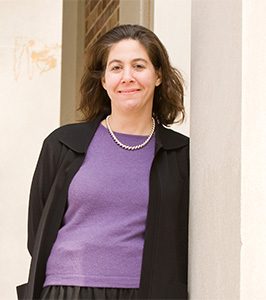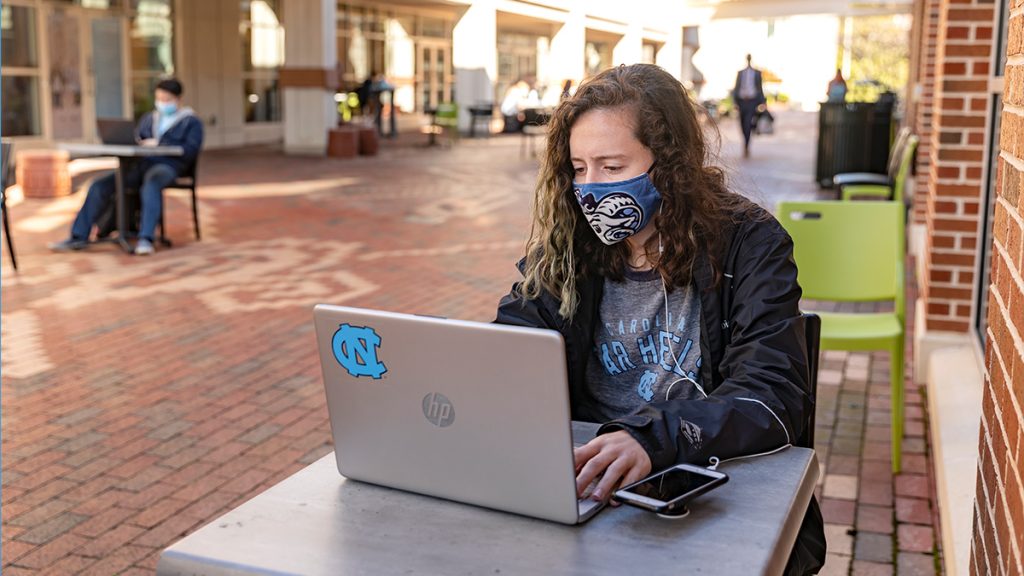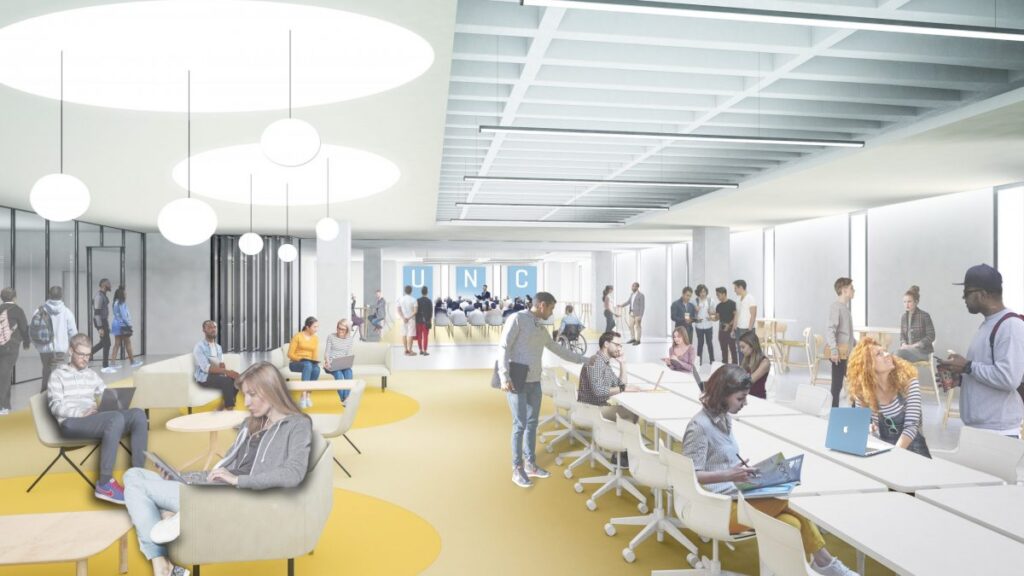Strengthen Student Success
Strengthen Student Success
Environmental Scan
Carolina has long sought to offer a great education while remaining accessible and affordable to outstanding students from North Carolina and beyond. That commitment requires constant reinvention to provide an educational experience that prepares students “to become lifelong learners, approaching the world with curiosity and open minds,” as described in the IDEAS in Action General Education Curriculum.
Today’s world and workplace demand that university graduates at all levels demonstrate the following skills: resilience, self-sufficiency and self-awareness; the capacity to think critically and to solve problems not just in isolation but within complex, uncertain real-life situations; the ability to communicate effectively, be culturally competent and work well in teams; and the facility to use and understand data. While it remains essential for undergraduate students to acquire substantive knowledge through a foundational liberal arts education, we must also adapt and refine curricula, pedagogies and co-curricular offerings to foster the development of skills that workplaces demand and that are needed for an engaged citizenry. Central to this idea is the need to design educational experiences, both in and outside the classroom, that foster creativity. To achieve all of this requires that students engage in more active and applied learning; personalize their learning in ways that reveal, develop and build upon their unique strengths and talents; and take advantage of experiential learning and development opportunities.
Further, we believe that all admitted students can and should thrive academically and develop personal skills and attributes that support success. Students must be able to take full advantage of the breadth and depth of our curriculum, set academic and personal goals, and take responsibility for their education, choices and decisions. We need to empower our students to act on behalf of their own development to experience all that a Carolina education offers. This means that, as a University, we will need to integrate and enrich the overall student experience and ensure that all students have equitable opportunities to thrive at Carolina and beyond. Likewise, we must design and modernize university systems and processes that integrate the academic, life skills, care services and other aspects of student development; and we must ensure easy student access to timely and accurate information about academics, support for physical and mental well-being and careers.
We also must continue to reach students who seek, but cannot gain access to, an excellent education. We share the UNC System’s commitment to increase enrollments and degrees earned by low-income and rural North Carolinians and to enroll a diverse student body. Carolina has a strong tradition of off-setting tuition expenses for low-income and rural students, but many qualified students still cannot participate in a traditional residential education due to life circumstances. At the same time, societal changes and the rapid evolution and application of digital technology are transforming ways that universities can reach students. Carolina embraces its obligation to provide high-quality, well-designed curricula and programs through technology-enhanced learning to students, North Carolinians and others whose careers, locations or schedules require it.
It is also important for us to prepare graduate and professional students to become leaders in their chosen fields and apply their knowledge to solve problems in our state, nation, and the world. In addition to ensuring that every graduate of Carolina is data literate, we will expand graduate training in data science to enhance discovery of new information and technologies for improving the quality of life for all citizens. We will continue to strive to increase the competitiveness of our programs in attracting the top graduate students and supporting them in the key roles they play in the instructional and research mission of the University.
Strategic Objectives and Opportunities
Objective 2.1
Provide a student-centered experience, strengthen success for all students and foster equity in success across student populations.
Strategic Opportunities
- Evaluate and implement recommendations from the Modernizing Student Support Working Group, including developing and launching the Thrive Hub Model.
- Incentivize and support faculty engagement for student success.
- Use innovative, shared and comprehensive processes and systems to enhance student success and degree audit tools.
- Address student mental health issues and implement recommendations of the Mental Health Task Force.
- Deploy technologies for all faculty members to allow faculty to better understand the students they teach, including the My Course Analytics Dashboard, an inclusive teaching tool.
- Launch the Master’s in Applied Professional Studies program.
Objective 2.2
Facilitate learning that is experiential and collaborative, develops individual strengths and encourages the understanding, ethical use and application of data.
Strategic Opportunities
- Implement the IDEAs in Action General Education Curriculum.
- Assure that every graduate of UNC-Chapel Hill is data literate.
- Create a school of data science.
- Implement a data science Professional Science Master’s program.
Objective 2.3
Expand digital and remote technologies to increase access and opportunities for Carolina students, as well as for all the people of North Carolina and beyond.
Strategic Opportunities
- Train Carolina faculty members in state-of-the-art pedagogies for remote learning to increase equity in educational access, flexibility for faculty and students, and breadth of course and program offerings.
- Launch the Digital Residential and Non-Residential Lifelong Learning Initiative.
- Assess and select technology partners, including Online Program Managers and student success tools, to fast-track the digital residential and non-residential needs for remote courses.
- Develop and implement the integration of Carolina Courses Online with the Carolina Office for Online Learning.
Captain

Senior Associate Dean for Undergraduate Education
Abigail Panter, PhD, is the senior associate dean for Undergraduate Education and a professor of psychology in the L. L. Thurstone Psychometric Laboratory at University of North Carolina at Chapel Hill. Panter has been a member of the University faculty since 1989. As senior associate dean, she oversees all of the College’s programs in undergraduate education. Among her active work on campus, she has been involved in reviews of the undergraduate curriculum, student learning outcomes for the University system and programs to increase the high impact academic experiences for all undergraduate students.




